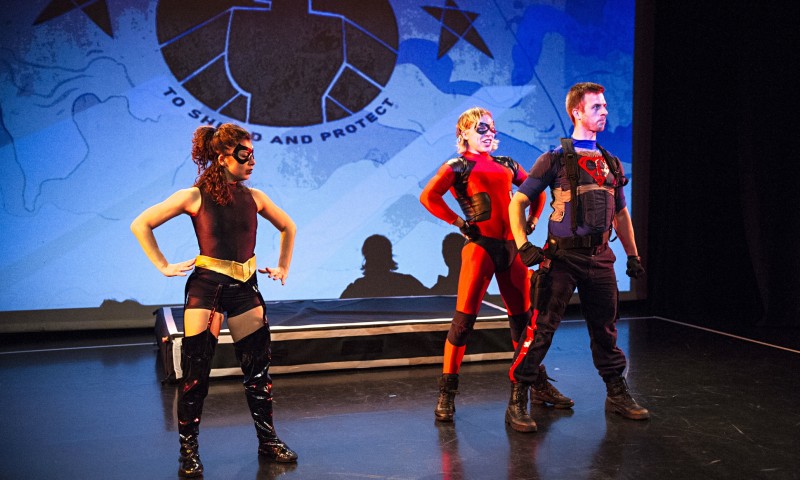 Commissioned by Dance City, the North East’s development agency for dance, R.I.O.T’s choreography includes highly dextrous acrobatic fight sequences between four seemingly stereotypical superheroes, led by the self-proclaimed and increasingly controlling Captain Patriot. R.I.O.T. is co-directed by Deirdre McLaughlin and Joseph Mercier, and Mercier also features in the piece alongside Sabrina Gargano, Jordan Lennie, and Tess Letham, all of whom are accomplished physical performers. The comic-book superhero genre is mined here for all it is worth, the premise being that the four performers want to take on super-hero personas on their own terms. They frequently interject with comments about their roles as the narrative progresses, to the amusement of many in the audience and to the increasing annoyance of Captain Patriot. There is plenty too in the way of intertextuality, with references to a vast array of publications, as well as to familiar plot lines and well known heroes. This serves to both contextualise the piece and to provide a structure which the performers can subsequently rail against.
Commissioned by Dance City, the North East’s development agency for dance, R.I.O.T’s choreography includes highly dextrous acrobatic fight sequences between four seemingly stereotypical superheroes, led by the self-proclaimed and increasingly controlling Captain Patriot. R.I.O.T. is co-directed by Deirdre McLaughlin and Joseph Mercier, and Mercier also features in the piece alongside Sabrina Gargano, Jordan Lennie, and Tess Letham, all of whom are accomplished physical performers. The comic-book superhero genre is mined here for all it is worth, the premise being that the four performers want to take on super-hero personas on their own terms. They frequently interject with comments about their roles as the narrative progresses, to the amusement of many in the audience and to the increasing annoyance of Captain Patriot. There is plenty too in the way of intertextuality, with references to a vast array of publications, as well as to familiar plot lines and well known heroes. This serves to both contextualise the piece and to provide a structure which the performers can subsequently rail against.
Although the London riots are identified as the show’s inspiration in surrounding material, this strand didn’t come across to me, but the show’s framework does allow for plenty in the way of humorous asides, conflict in the form of inter-cast squabbling and explorations of identity, as character functions and abilities are gradually picked apart. ‘I don’t want to be stuck in a story that I didn’t choose’ states the character ‘Mind Games’ at one point, neatly summing up the themes of ownership and representation that bubble under the show’s surface. This is a clever conceit which I would have been interested to see more of and perhaps less of some of the physical sequences, which although impressive, were also sometimes rather lengthy. I do understand the reasoning behind their inclusion; for a target audience of comic book fans, the representation of fight scenes performed by real people in a way that parodies familiar sequences must hold significant appeal.
The idea of presenting a piece which uses stereotypes (the strong leader, the humorous but disposable sidekick, the sexy female villain and her beautiful shape-shifting accomplice) to present what appears to be a straightforward story about the triumph of good over evil, but ends up coming apart at the seams when critiqued, is a clever and fascinating one, and is very well delivered for the most part. There were moments when I wanted the stereotypes to be played at a more heightened level to keep me really immersed and to achieve the sense of parody which the piece seemed to be reaching for, but the narrative pace and some very funny interactions with the audience (which included a number of young children) helped to sustain my interest. The eventual pay-off is very well executed too, there is a delightful inevitability in seeing the Captain’s world fall apart, and a nod to the genre’s classic moral code about being true to oneself that resonates well.
